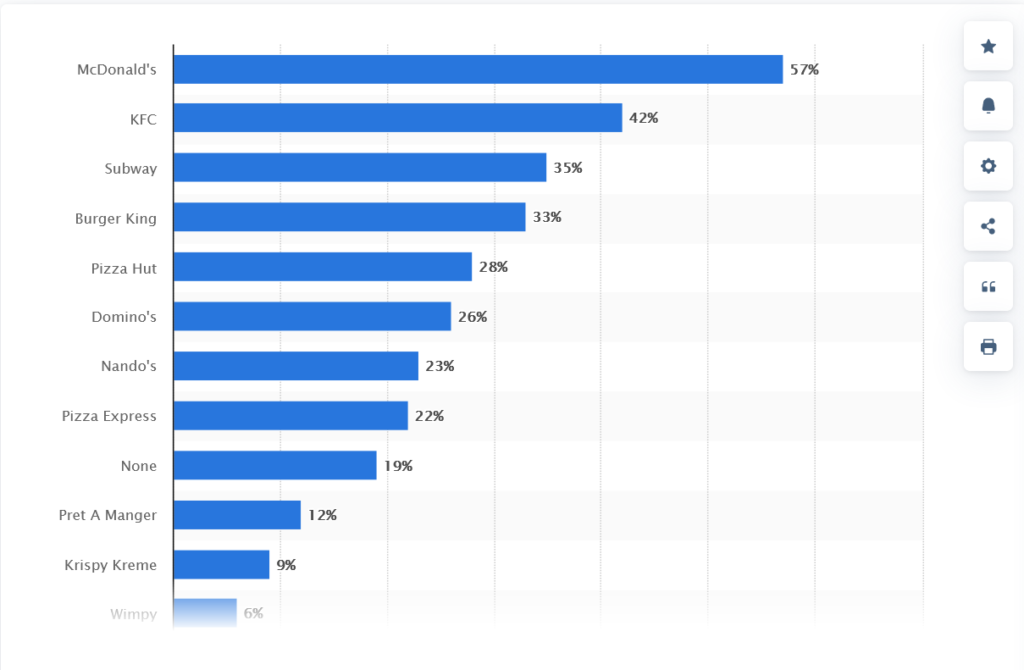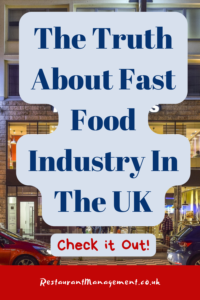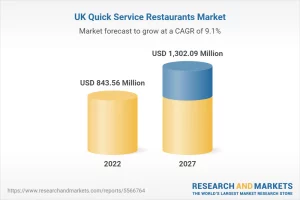Exploring the Fast Food Industry in the United Kingdom: A Look at the History, Players, and Trends
Table of Contents
The fast food industry in the UK has a long and storied history, and it continues to change and adapt to shifting consumer tastes and trends. From traditional fish and chips to international franchises, the fast food business in the UK is a vital component of the country’s economy.
The market is valued at roughly £18 billion and is increasing at a CAGR of nearly 4% between 2020 and 2025.
Many modern diets include fast food, and the United Kingdom is no exception. The fast food industry in the United Kingdom is a key contributor to the country’s economy, with options ranging from traditional fish and chips to multinational franchises. This article examines the history, major players, and trends of the fast food sector in the United Kingdom.

History of the Fast Food Industry in the UK
The origins of the fast food industry in the United Kingdom date back to the 19th century, when street sellers and fish and chip shops first appeared. However, it was not until after World War II that fast food chains gained prominence in the United Kingdom.
- Fish and chips were originally offered as a complete meal around 1860, with both the Malin family of London and the Lee of Mossley, near Manchester claiming to be the first to do so. Before this, however, the fried fish and cooked potato industries had operated for many years.
- Greggs, the bakery chain was founded in the North East of England in 1939 and has grown to become the largest bakery chain in the United Kingdom, with more than 2,000 locations nationwide.
- In 1954, Wimpy’s opened its first restaurant in the United Kingdom and served the country’s first Hamburg location in London’s Lyons Corner House.
- Before McDonald’s and Burger King, Wimpy was the most popular burger joint in the United Kingdom.
- Kentucky Fried Chicken (KFC) was the first American fast food franchise to operate in the United Kingdom in 1965. From that point on, the sector continued to expand, with McDonald’s and Burger King entering the market in the 1970s.
- Curry marketed in Britain is also a far cry from the original dishes served in India.
- Many takeaway establishments have begun offering chips alongside traditional rice and noodles to compete with the fast food chains that arose in Britain in the 1970s.
Inside The World Of Quick Bites: Exploring Fast Food Culture
Evolution of Fast Food in the UK
The UK fast food sector has seen considerable changes in recent years. The increase in health-conscious consumers has prompted a desire for better options and greater ingredient disclosure in the fast food industry. In addition, the expansion of technology and social media has altered the ordering and consumption of fast food, since online ordering and delivery have become increasingly popular.
What are the top 5 fast food restaurant chains in the UK?
McDonald’s, KFC, Subway, Burger King, and Pizza Hut are, according to a Statista report for 2020, the top five fast food chains in the UK by number of locations.
Which fast food establishment is the most popular in the United Kingdom?
The most popular fast food restaurant in the United Kingdom is McDonald’s, followed by KFC and Subway.
What is the most famous fast food In the UK?
As a traditional dish that has been eaten for decades, fish & chips are commonly regarded as the most popular fast food in the United Kingdom.
Does London have fast food restaurants?
Yes, London boasts a vast selection of fast food restaurants, including traditional fish and chip shops and worldwide franchises such as McDonald’s, KFC, Subway, and Burger King.
Related articles:
The Top 5 Fast Food Restaurants In The UK
How To Start A Fast Food Restaurant
Restaurant Management Structure

Fast Food Industry Statistics in the UK
Here is a summary of the size and growth of the UK fast food market. An analysis of British consumer spending on fast food and a comparison of the British fast food market to those of other nations.
The Size and Growth of the Fast Food Market in the UK
According to a Statista report for 2020, the fast food market in the United Kingdom is worth roughly £18 billion. Between 2020 and 2025, the market is anticipated to expand by around 4% per year. This expansion is fuelled by many factors, including an expanding population and economy.
In addition, the advent of technology and social media has led to a surge in online ordering and delivery, boosting the industry even further.
Market Share Fast Food UK
The United Kingdom is a thriving hub for renowned chains like McDonald’s and KFC. Analyzing the fast-food market share UK in 2015 reveals intriguing insights into consumer preferences, market dynamics, and industry trends.

McDonald’s vs. KFC: A Battle for Supremacy
According to data from the Statista Research Department, McDonald’s emerged as the top choice for 57 per cent of respondents, while 42 per cent favoured KFC. This dominance underscores McDonald’s stronghold in the UK fast-food market. However, despite its popularity, the distribution of McDonald’s restaurants per million people in the UK still needs to be higher than in similar nations.
McDonald’s: A Global Giant with Regional Revenue
McDonald’s not only leads in consumer preference but also revenue generation. In 2014, Europe outpaced the United States in generating revenue for McDonald’s, with a staggering $11.08 billion in revenue, underscoring the global reach and profitability of the fast-food giant, with the UK serving as a significant contributor to its European revenue stream.
The UK’s Appetite for Food and Beverage Services
Despite its relatively smaller population than France and Germany, the United Kingdom boasts a higher food and beverage service industry turnover. In 2015, the turnover in the UK reached €87.7 billion, surpassing France and Germany, highlighting the robust consumer spending habits and the lucrative nature of the UK food market.
Implications for Market Players
For fast-food chains eyeing expansion or market entry, the UK presents a promising landscape with opportunities. However, success hinges on brand recognition, strategic distribution, and alignment with consumer preferences. Understanding the nuances of the UK market dynamics is imperative for sustaining growth and outperforming competitors.
The dominance of fast-food giants like McDonald’s and KFC in the UK underscores the nation’s appetite for convenient dining options. With McDonald’s leading in consumer preference and revenue generation and the UK boasting a substantial turnover in the food and beverage service industry, the landscape is ripe with opportunities for market players. By strategically navigating the market dynamics and aligning with consumer preferences, fast-food chains can capitalize on the UK’s thriving food industry and secure their position in this lucrative market.

Fast Food Statistics UK
What is the fast food statistics uk?
Here are some statistics related to the fast food industry in the UK:
- Market Size: The fast food market in the UK is substantial, with a value of over £23 billion annually.
- Revenue Growth: Despite economic challenges, the fast food sector has grown steadily.
- Popular Chains: Major fast food chains like McDonald’s, KFC, Burger King, Subway, and Greggs dominate the UK market.
- Health Consciousness: There’s a growing trend towards healthier fast food options, with consumers demanding more transparency regarding ingredients and nutritional information.
- Regional Variations: Market share and dominance of delivery service platforms may vary in different regions of the UK. Some platforms might be more prevalent in urban areas, while others could have a more substantial presence in suburban or rural locations.
- Sustainability: The fast food sector increasingly emphasises sustainability, with many chains introducing initiatives to reduce plastic usage, source ethically, and minimise environmental impact.
What is the size and share of this Delivery Service?
Delivery Services: The fast food industry has been significantly impacted by the emergence of food delivery services, which have been facilitated by platforms such as Just Eat, Deliveroo, and Uber Eats.
As of the latest available data, the food delivery services sector in the UK has experienced substantial growth and has become a significant part of the fast food industry. Here are some crucial details about the size and market shares:
Market Size: The food delivery services market in the UK is estimated to be worth several billion pounds annually. The numbers may differ based on when and where the information was obtained.
As of 2022, the UK food delivery service market is estimated to be worth approximately £8 billion annually. Just Eat held the largest market share, accounting for approximately 45% of the market, followed by Deliveroo with around 30% and Uber Eats with approximately 20%. The remaining market share was distributed among smaller players and local delivery services.
Market Leaders: Eat, Deliveroo, and Uber Eats are among the leading UK food delivery market players. These platforms have a considerable market share and compete vigorously for customers and restaurant partnerships.
Growth Trends: The food delivery sector continues to experience robust growth, driven by changing consumer preferences, technological advancements, and the increasing popularity of convenience-oriented services.
Overall, the rise of food delivery services has significantly impacted the fast food industry in the UK, providing consumers with greater convenience and choice while presenting both opportunities and challenges for restaurants and delivery platforms alike.
Consumer Spending on Fast Food in the UK
In the United Kingdom, customers devote a substantial percentage of their food budget to fast food. The average British household spends around £230 annually on fast food, according to 2019 research from the Office for National Statistics.
This equates to roughly 7 per cent of the average household’s food budget.
The fast food industry in the United Kingdom is a significant contributor to the country’s economy, with a value of roughly £18 billion and a CAGR of approximately 4% between 2020 and 2025.
The market is influenced by many factors, such as a growing population and economy, as well as the rise of technology and social media. Approximately 7% of the average household’s food budget is allocated to fast food in the United Kingdom, which compares favourably with other countries.

International Comparison
Comparison of the British fast food industry to those of other nations. The presence and appeal of foreign fast food chains in the United Kingdom are analysed.
Fast Food Market in the UK compared to other countries
The size and expansion of the fast food market in the United Kingdom are comparable to that of markets in other nations.
According to a report published by Research and Markets in 2020, the worldwide fast food industry is projected to reach $817.9 billion (£660.61 billion) by 2027, expanding at a CAGR of 5.5% over the time of forecast. The United States and China dominate the worldwide fast-food sector in terms of market share.
International Fast Food Chains in the UK
The market for fast food in the United Kingdom is highly affected by overseas chains. Many of the leading fast food chains in the United Kingdom, including McDonald’s and KFC, are American corporations.
Moreover, international companies like Subway and Pizza Hut have a substantial presence in the United Kingdom. This variety of international options has significantly contributed to the expansion and popularity of the UK fast food business.
The fast food market in the United Kingdom is a significant contributor to the country’s economy and is comparable to markets in other nations in terms of size and growth.
The market is significantly impacted by multinational chains, with many of the leading fast-food businesses in the United Kingdom being owned by American corporations.
The variety of international options has significantly contributed to the expansion and popularity of the UK fast food business.
It is also crucial to note that as consumers become more health-conscious, fast food restaurants are changing and providing healthier options to meet consumer demand.

Fast Food Industry Health Concerns And Adaptations
An analysis of the health risks connected with fast food and the modifications fast food restaurants have taken to address these issues
Concerns regarding Fast Food and Health
Obesity, cardiovascular disease, and diabetes have long been linked to the consumption of fast food. This is because many fast food menu items have high levels of saturated fat, salt, and sugar. Moreover, fast food is frequently heavy in calories, which can lead to weight gain.
Fast food has long been associated with health risks, such as obesity, heart disease, and diabetes. However, in recent years, fast food restaurants have been taking steps to address these concerns.
Adaptations made by Fast Food Chains
Fast food restaurants have made attempts in recent years to address these health problems. Salads, grilled chicken sandwiches, and whole wheat buns can now be found on the menus of numerous franchises.
Food establishments began giving nutritional information for their menu items, allowing customers to make more informed meal choices. In addition, Regulation (EU) No 1169/2011 on the provision of food information to consumers will continue to govern the nutrition labelling requirements in the United Kingdom after the 31st of December, 2020.
Additionally, fast food chains are also responding to the increased demand for plant-based options, and many chains now provide plant-based alternatives to typical meat-based options.
Many businesses now offer healthier menu alternatives and include nutritional information to assist customers to make more educated choices. It is crucial for consumers to be aware of the health issues associated with fast food, but also to identify the changes made by fast food franchises to address those concerns.

Impact of COVID-19 on the Fast Food Industry in the UK
The COVID-19 epidemic has had a severe influence on the fast food business in the UK. Many fast food companies had to temporarily close their dining rooms and rely on drive-thru, delivery and take-out service.
In response to the lockdowns and social distancing measures, consumer demand for fast food declined as people cooked more at home. These reasons led to a fall in sales and revenue for numerous fast food companies in the UK.

Changes in Consumer Behavior and Demand
The epidemic has also caused changes in consumer behaviour and demand for fast food. With more people working and studying from home, there was an increased demand for delivery and take-out service, as well as an increased interest in meal kit services.
Additionally, with more individuals cooking at home, there was a growing interest in convenience and easy-to-prepare food options.
However, there was a huge demand for fast food, such as an increased interest in delivery and take-out services, meal kit services and easy-to-prepare meal options.
As limitations ease and the pandemic comes to a close, it remains to be seen how the fast food business in the UK will adapt and recover. It is possible that the sector will continue to evolve and respond to the changing consumer preferences and trends.
What are the revenue and net earnings of the top five corporations in the market?
McDonald’s is the largest fast food chain in the world and one of the most profitable. In 2021, McDonald’s recorded revenue of $23.22 billion and a net income of over $5 billion.
Other large fast food businesses, such as KFC, Subway, and Burger King, also generate significant income and profits, but the actual statistics can vary depending on the year and the specific market.
What is the most ordered takeaway in the UK?
In 2021, the most popular type of takeaway cuisine in Great Britain was Chinese, with 25 percent of respondents reporting that this was the case. Meanwhile, the second and third most popular types of takeaway meals were Indian and fish and chips, respectively.
Conclusion
The market is driven by a multitude of factors, including a burgeoning population and a growing economy, as well as the advent of technology and social media. Consumer spending on fast food in the UK is also large, with the average household spending roughly 7% of their food budget on fast food.
The fast food sector is also confronting health problems, however, many fast food businesses have been making attempts to address these concerns by giving better menu alternatives, providing nutritional information and adapting to plant-based options.
The COVID-19 epidemic has also had a substantial impact on the fast food business in the UK, resulting in a fall in sales and revenue for many fast food chains, but also a shift in customer behaviour and demand for fast food.
As limitations ease and the pandemic comes to a close, it remains to be seen how the fast food business in the UK will adapt and recover.
However, the sector will probably continue to evolve and adjust to the changing consumer preferences and trends, as well as to health concerns. The fast food business will continue to be an essential component of the UK’s economy and eating culture.
From traditional fish and chips to international chains, the fast food industry in the UK is a major player in the country’s economy. With a growing demand for healthier options and transparency about ingredients, the fast food industry in the UK is likely to continue to change and adapt in the future.
Frequently Asked Questions And Answers
What is the fast food industry in the UK?
The fast food industry in the UK refers to the sector comprised of quick-service restaurants that offer convenient, often pre-prepared meals for immediate consumption. It encompasses many food options, including burgers, fries, pizza, sandwiches, and more. Fast food establishments prioritize speed and convenience, catering to customers seeking quick meals on the go or delivered to their doorstep. The industry plays a significant role in the UK’s food economy, contributing to employment, revenue generation, and consumer preferences.
What is the biggest fast food industry?
The term “fast food industry” refers to the collective sector of quick-service restaurants worldwide. While specific data may vary depending on metrics such as revenue, market share, or number of outlets, globally recognized fast food chains such as McDonald’s, KFC, Subway, and Burger King often dominate discussions of the most prominent players in the industry. These multinational corporations operate across numerous countries and continents, serving millions of customers daily and generating substantial revenue.
Is McDonald’s a part of the fast food industry?
Yes, McDonald’s is a quintessential example of a fast food chain and a prominent player in the fast food industry. Founded in 1940, McDonald’s has grown into one of the world’s largest and most recognizable fast food brands, operating thousands of restaurants across the globe. Known for its iconic menu items such as the Big Mac, Chicken McNuggets, and fries, McDonald’s epitomizes the fast food model, offering consumers convenient, affordable, and standardized meals.



